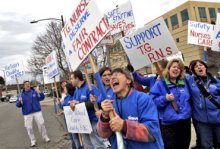
Hospital officials at Tacoma General Hospital and 650 nurses represented by the Washington State Nurses Association are hoping a new session with a federal mediator scheduled for March 28 will help the two sides reach a new labor pact between the hospital and some 650 nurses represented by the Washington State Nurses Association. Read the article from The News Tribune here.

